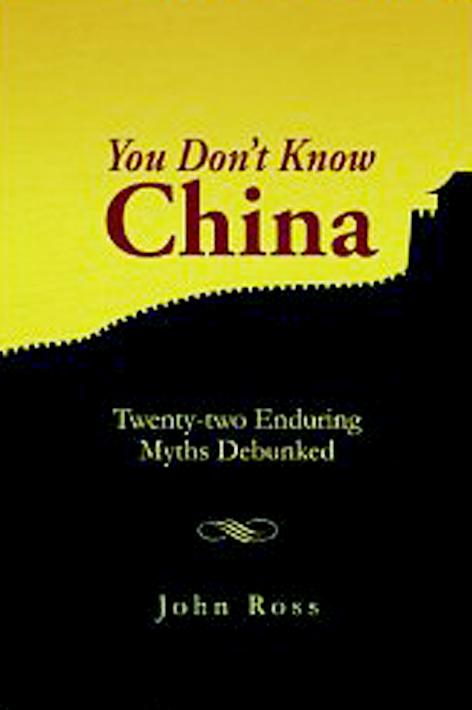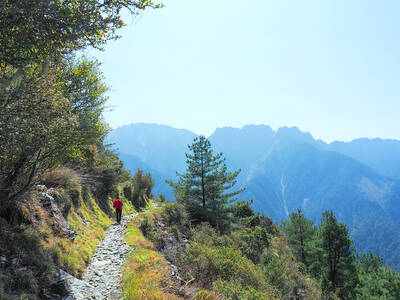China for Westerners, writes John Ross, is “a wellspring of exoticism, hyperbole and myths.” Here he sets out to expose some of the last, and astonishingly good reading it makes.
Firstly, China is not uniquely old. The city of Uruk in Iraq was founded 7,000 years ago, and the Egyptian and Mesopotamian writing systems are older than China’s.
Secondly, fengshui: It’s “a pseudoscience at best, an outright fraud at worst.” Such systems haven’t stopped rampant ecological damage in either Taiwan or China, Ross says, because they were never about natural beauty or ecology in the first place.

Acupuncture? “The inescapable conclusion is that the principles of qi flows and points upon which acupuncture is based are erroneous.” In addition, it may not have originated in China at all. Radical modernizers in early 20th century China tried to have it banned.
As for traditional Chinese medicine in general, Ross believes it’s mostly based on superstition. Things such as snake oil, rich in omega-3 fatty acids, may be efficacious, but if you look at old European medicine you’ll find the four humors there as well. “In the West we’ve ditched most of our old superstitions,” Ross writes, “but China has not made a clean break, partly because of national pride.” He thinks Chinese health may come simply from the habit of drinking boiled water.
And so it goes on, through Marco Polo (he may or may not have gone to China, but he certainly didn’t introduce noodles into Italy), Confucius (“China is not a Confucian society”), China’s mega-cities (it all depends where you draw the boundaries), “ghost cities” like Ordos (they’re real, but untypical), and so on.
The list continues. Do the Chinese eat dogs and cats? Some do, but only occasionally. The Great Wall? It’s not continuous, and certainly not the only man-made structure visible from “space” (however you define that term). The UK’s Lord Macartney’s refusal to kowtow to the Chinese emperor in 1793? A fact, but Ross unravels the complex historical background that should be taken into account.
And so he goes on. China’s traditional isolationism? China had extensive relations with other regions, varying with the historical period. Nixon’s visit to China in 1973? Not the world-changing event it’s been made out to be.
Then comes the interesting stuff.
“What Really Happened in Tiananmen Square?” I’m not going to reveal what Ross concludes here. It’s in many ways the heart of the book, and it deserves to remain its selling-point. Suffice it to say that his analysis is skeptical, questioning the emotionalism and bias of the Western media. But there’s more to what he says than this, and you must read this fine chapter to find it out. It contains things you rarely encounter in accounts intent on presenting the public with evidence of a brutal massacre whatever the cost.
This chapter was so sane, in fact, that it encouraged me to believe the bulk of what Ross argues for on his other topics. It showed his reasonableness and his grasp of reality, not to mention his reluctance to toe the line when confronted with propaganda of any political color.
It’s important to note, by the way, that this isn’t a pro-PRC book, nor an anti-PRC one either. There are places where Ross has the caution and even-handedness of a genuine analytical mind. I know this reads like hyperbole, but it amazes me that a book like this comes from a small local publisher when so much that is tendentious and partisan is put out by major international publishing houses.
Other topics include manufacturing conditions in the PRC. This is another admirable analysis, showing matters to be far less clear-cut than Western observers with an axe to grind would have us believe. By this stage in the book it seemed as if Ross couldn’t put a foot wrong.
The “myths” taper away amiably enough after the heights of Tiananmen Square and factory working conditions. We have Mandarin (not going to challenge English as a world language any time soon, and unlikely to repay even prolonged study in purely cash terms). This section, though, did seem unduly anecdotal.
But then comes another fine pair of chapters on opium and the Opium Wars. The drug was used for 1,000 years in China without much harmful effect, Ross says, contrary to PRC anti-imperialist propaganda. It’s another instance of Ross’s well-researched sanity. No drug-user himself, he says he changed his mind about opium after studying the literature on the subject. As for the Opium Wars, the British were certainly the bullies, but the Chinese weren’t blameless either. There’s an illuminating digression here on the imperial examination system — not the meritocratic marvel it’s been made out to be.
On the alleged park notice in Shanghai “No dogs or Chinese,” Ross is very informative. The rules stated it was a park for foreigners, and that no dogs or bicycles were allowed. Putting two and two together did the rest.
The book closes with the opinion that the Chinese have suffered more from their own compatriots than from foreigners. Here I had my doubts, though in numbers of deaths he’s of course right. Suffering from elites, though, is a world-wide phenomenon, but what were all those foreigners doing in China in the first place?
Ross tackles many of his popular fallacies with the dispassionate learning of a true historian, combining genuine understanding with a common touch. A previous book of his, Formosan Odyssey, a mixture of history and travelogue about Taiwan, was also both knowledgeable and accessible. It was reviewed in the Taipei Times on July 21, 2002. But this new venture is a far more weighty undertaking.
You Don’t Know China is in many ways an outstanding book, with its chapters on Tiananmen, factory conditions and opium the highlights. A sequel is promised, with topics including Chiang Kai-shek (蔣介石), the role of women and Tibet. I must be excused for saying that I can hardly wait.

“Why does Taiwan identity decline?”a group of researchers lead by University of Nevada political scientist Austin Wang (王宏恩) asked in a recent paper. After all, it is not difficult to explain the rise in Taiwanese identity after the early 1990s. But no model predicted its decline during the 2016-2018 period, they say. After testing various alternative explanations, Wang et al argue that the fall-off in Taiwanese identity during that period is related to voter hedging based on the performance of the Democratic Progressive Party (DPP). Since the DPP is perceived as the guardian of Taiwan identity, when it performs well,

The Taiwan People’s Party (TPP) on May 18 held a rally in Taichung to mark the anniversary of President William Lai’s (賴清德) inauguration on May 20. The title of the rally could be loosely translated to “May 18 recall fraudulent goods” (518退貨ㄌㄨㄚˋ!). Unlike in English, where the terms are the same, “recall” (退貨) in this context refers to product recalls due to damaged, defective or fraudulent merchandise, not the political recalls (罷免) currently dominating the headlines. I attended the rally to determine if the impression was correct that the TPP under party Chairman Huang Kuo-Chang (黃國昌) had little of a

At Computex 2025, Nvidia CEO Jensen Huang (黃仁勳) urged the government to subsidize AI. “All schools in Taiwan must integrate AI into their curricula,” he declared. A few months earlier, he said, “If I were a student today, I’d immediately start using tools like ChatGPT, Gemini Pro and Grok to learn, write and accelerate my thinking.” Huang sees the AI-bullet train leaving the station. And as one of its drivers, he’s worried about youth not getting on board — bad for their careers, and bad for his workforce. As a semiconductor supply-chain powerhouse and AI hub wannabe, Taiwan is seeing

Jade Mountain (玉山) — Taiwan’s highest peak — is the ultimate goal for those attempting a through-hike of the Mountains to Sea National Greenway (山海圳國家綠道), and that’s precisely where we’re headed in this final installment of a quartet of articles covering the Greenway. Picking up the trail at the Tsou tribal villages of Dabang and Tefuye, it’s worth stocking up on provisions before setting off, since — aside from the scant offerings available on the mountain’s Dongpu Lodge (東埔山莊) and Paiyun Lodge’s (排雲山莊) meal service — there’s nowhere to get food from here on out. TEFUYE HISTORIC TRAIL The journey recommences with